Common Law: Statutory Interpretation and Judicial Precedent
VerifiedAdded on 2021/06/17
|11
|3533
|144
Report
AI Summary
This report delves into the common law system, exploring its reliance on custom and judicial precedent rather than statutes. It examines the principles of statutory interpretation, analyzing how courts determine the meaning of laws, and highlights the complexities of literal, golden, and mischief rules. The report also discusses judicial precedent, the doctrine of stare decisis, and the binding nature of previous court decisions, along with the advantages and disadvantages of this approach. Furthermore, it investigates the role of judges in lawmaking and the challenges they face in balancing precedent with modern justice. The report concludes by summarizing the key elements of the common law system and its impact on legal practice.

Law 1
Law
Law
Paraphrase This Document
Need a fresh take? Get an instant paraphrase of this document with our AI Paraphraser
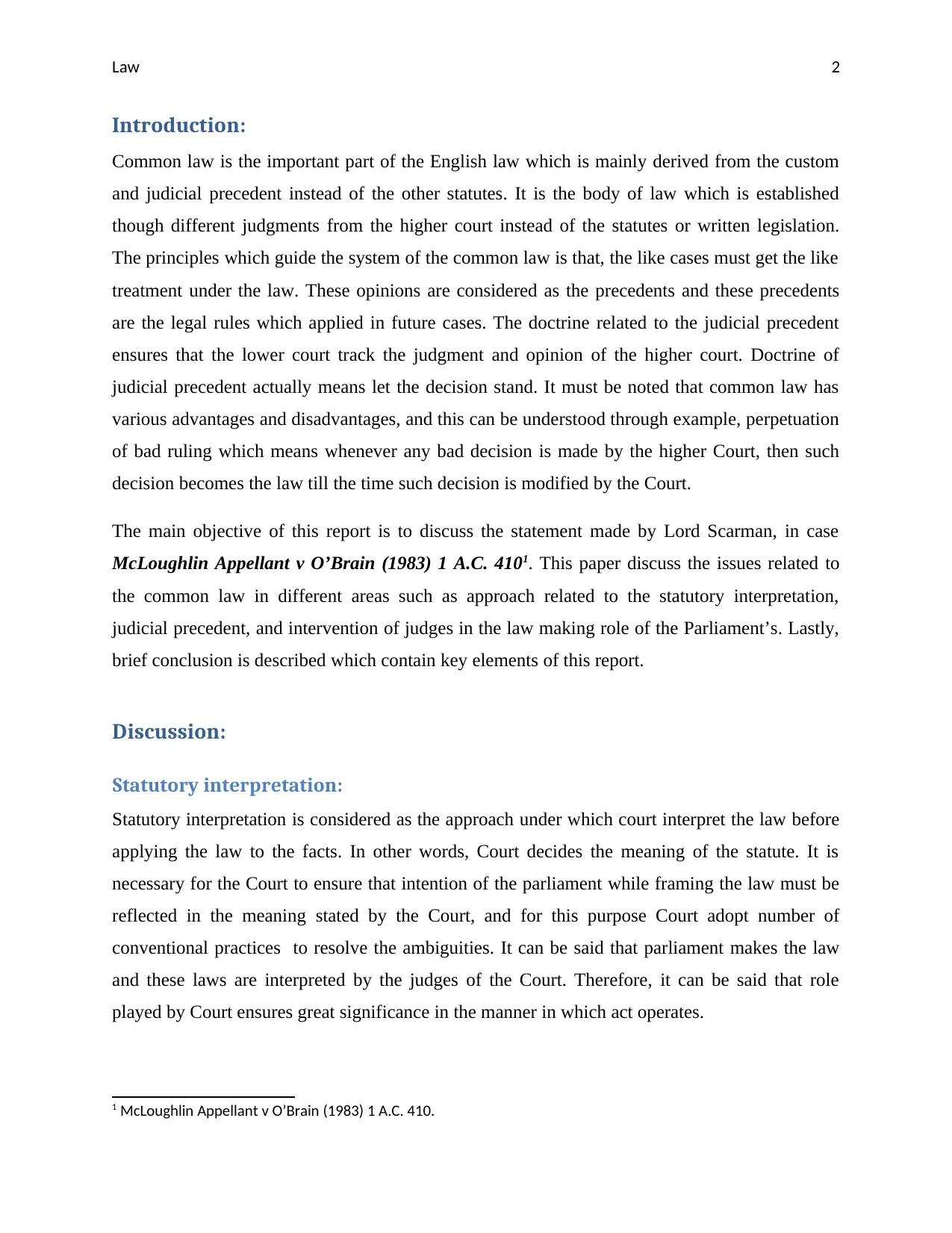
Law 2
Introduction:
Common law is the important part of the English law which is mainly derived from the custom
and judicial precedent instead of the other statutes. It is the body of law which is established
though different judgments from the higher court instead of the statutes or written legislation.
The principles which guide the system of the common law is that, the like cases must get the like
treatment under the law. These opinions are considered as the precedents and these precedents
are the legal rules which applied in future cases. The doctrine related to the judicial precedent
ensures that the lower court track the judgment and opinion of the higher court. Doctrine of
judicial precedent actually means let the decision stand. It must be noted that common law has
various advantages and disadvantages, and this can be understood through example, perpetuation
of bad ruling which means whenever any bad decision is made by the higher Court, then such
decision becomes the law till the time such decision is modified by the Court.
The main objective of this report is to discuss the statement made by Lord Scarman, in case
McLoughlin Appellant v O’Brain (1983) 1 A.C. 4101. This paper discuss the issues related to
the common law in different areas such as approach related to the statutory interpretation,
judicial precedent, and intervention of judges in the law making role of the Parliament’s. Lastly,
brief conclusion is described which contain key elements of this report.
Discussion:
Statutory interpretation:
Statutory interpretation is considered as the approach under which court interpret the law before
applying the law to the facts. In other words, Court decides the meaning of the statute. It is
necessary for the Court to ensure that intention of the parliament while framing the law must be
reflected in the meaning stated by the Court, and for this purpose Court adopt number of
conventional practices to resolve the ambiguities. It can be said that parliament makes the law
and these laws are interpreted by the judges of the Court. Therefore, it can be said that role
played by Court ensures great significance in the manner in which act operates.
1 McLoughlin Appellant v O’Brain (1983) 1 A.C. 410.
Introduction:
Common law is the important part of the English law which is mainly derived from the custom
and judicial precedent instead of the other statutes. It is the body of law which is established
though different judgments from the higher court instead of the statutes or written legislation.
The principles which guide the system of the common law is that, the like cases must get the like
treatment under the law. These opinions are considered as the precedents and these precedents
are the legal rules which applied in future cases. The doctrine related to the judicial precedent
ensures that the lower court track the judgment and opinion of the higher court. Doctrine of
judicial precedent actually means let the decision stand. It must be noted that common law has
various advantages and disadvantages, and this can be understood through example, perpetuation
of bad ruling which means whenever any bad decision is made by the higher Court, then such
decision becomes the law till the time such decision is modified by the Court.
The main objective of this report is to discuss the statement made by Lord Scarman, in case
McLoughlin Appellant v O’Brain (1983) 1 A.C. 4101. This paper discuss the issues related to
the common law in different areas such as approach related to the statutory interpretation,
judicial precedent, and intervention of judges in the law making role of the Parliament’s. Lastly,
brief conclusion is described which contain key elements of this report.
Discussion:
Statutory interpretation:
Statutory interpretation is considered as the approach under which court interpret the law before
applying the law to the facts. In other words, Court decides the meaning of the statute. It is
necessary for the Court to ensure that intention of the parliament while framing the law must be
reflected in the meaning stated by the Court, and for this purpose Court adopt number of
conventional practices to resolve the ambiguities. It can be said that parliament makes the law
and these laws are interpreted by the judges of the Court. Therefore, it can be said that role
played by Court ensures great significance in the manner in which act operates.
1 McLoughlin Appellant v O’Brain (1983) 1 A.C. 410.
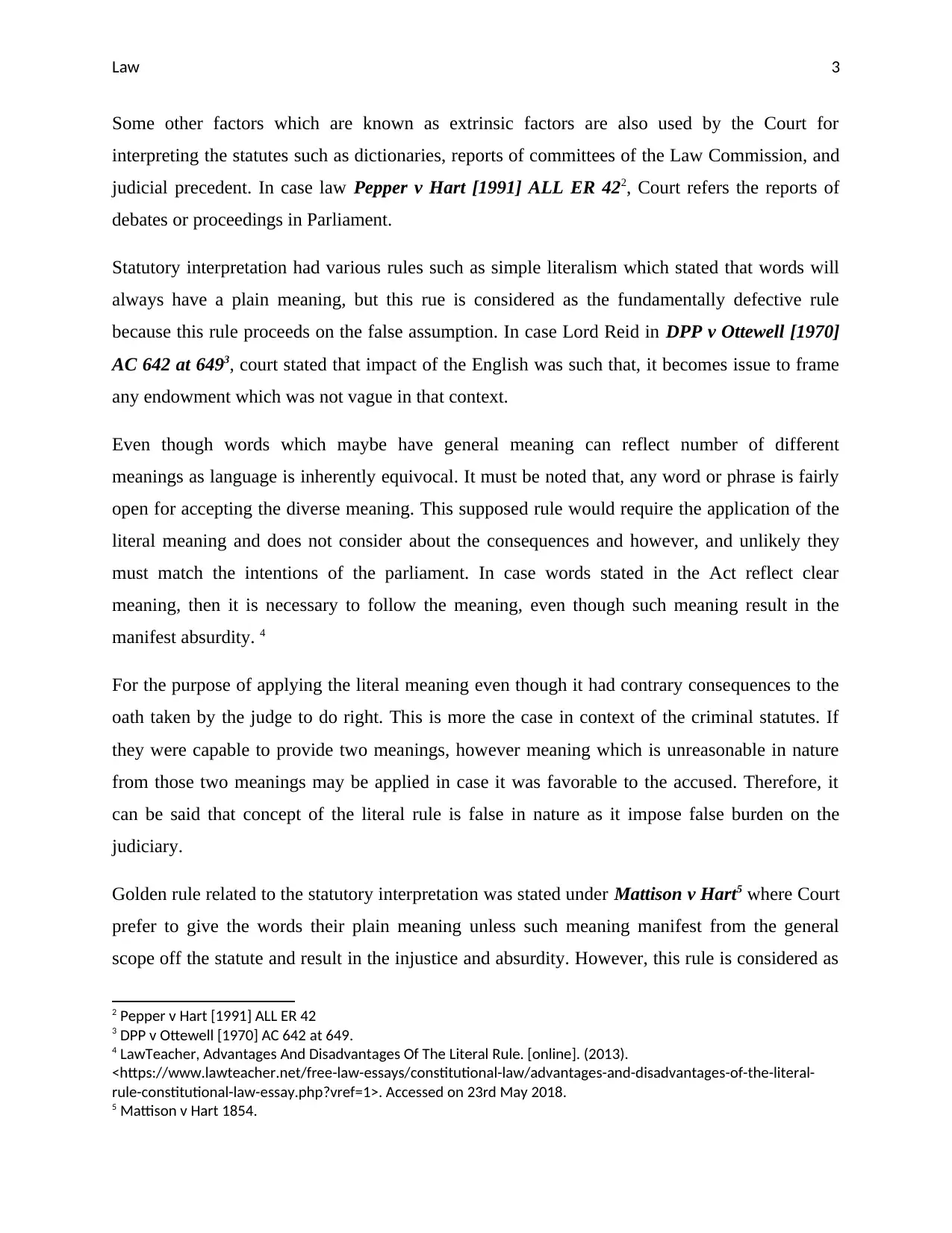
Law 3
Some other factors which are known as extrinsic factors are also used by the Court for
interpreting the statutes such as dictionaries, reports of committees of the Law Commission, and
judicial precedent. In case law Pepper v Hart [1991] ALL ER 422, Court refers the reports of
debates or proceedings in Parliament.
Statutory interpretation had various rules such as simple literalism which stated that words will
always have a plain meaning, but this rue is considered as the fundamentally defective rule
because this rule proceeds on the false assumption. In case Lord Reid in DPP v Ottewell [1970]
AC 642 at 6493, court stated that impact of the English was such that, it becomes issue to frame
any endowment which was not vague in that context.
Even though words which maybe have general meaning can reflect number of different
meanings as language is inherently equivocal. It must be noted that, any word or phrase is fairly
open for accepting the diverse meaning. This supposed rule would require the application of the
literal meaning and does not consider about the consequences and however, and unlikely they
must match the intentions of the parliament. In case words stated in the Act reflect clear
meaning, then it is necessary to follow the meaning, even though such meaning result in the
manifest absurdity. 4
For the purpose of applying the literal meaning even though it had contrary consequences to the
oath taken by the judge to do right. This is more the case in context of the criminal statutes. If
they were capable to provide two meanings, however meaning which is unreasonable in nature
from those two meanings may be applied in case it was favorable to the accused. Therefore, it
can be said that concept of the literal rule is false in nature as it impose false burden on the
judiciary.
Golden rule related to the statutory interpretation was stated under Mattison v Hart5 where Court
prefer to give the words their plain meaning unless such meaning manifest from the general
scope off the statute and result in the injustice and absurdity. However, this rule is considered as
2 Pepper v Hart [1991] ALL ER 42
3 DPP v Ottewell [1970] AC 642 at 649.
4 LawTeacher, Advantages And Disadvantages Of The Literal Rule. [online]. (2013).
<https://www.lawteacher.net/free-law-essays/constitutional-law/advantages-and-disadvantages-of-the-literal-
rule-constitutional-law-essay.php?vref=1>. Accessed on 23rd May 2018.
5 Mattison v Hart 1854.
Some other factors which are known as extrinsic factors are also used by the Court for
interpreting the statutes such as dictionaries, reports of committees of the Law Commission, and
judicial precedent. In case law Pepper v Hart [1991] ALL ER 422, Court refers the reports of
debates or proceedings in Parliament.
Statutory interpretation had various rules such as simple literalism which stated that words will
always have a plain meaning, but this rue is considered as the fundamentally defective rule
because this rule proceeds on the false assumption. In case Lord Reid in DPP v Ottewell [1970]
AC 642 at 6493, court stated that impact of the English was such that, it becomes issue to frame
any endowment which was not vague in that context.
Even though words which maybe have general meaning can reflect number of different
meanings as language is inherently equivocal. It must be noted that, any word or phrase is fairly
open for accepting the diverse meaning. This supposed rule would require the application of the
literal meaning and does not consider about the consequences and however, and unlikely they
must match the intentions of the parliament. In case words stated in the Act reflect clear
meaning, then it is necessary to follow the meaning, even though such meaning result in the
manifest absurdity. 4
For the purpose of applying the literal meaning even though it had contrary consequences to the
oath taken by the judge to do right. This is more the case in context of the criminal statutes. If
they were capable to provide two meanings, however meaning which is unreasonable in nature
from those two meanings may be applied in case it was favorable to the accused. Therefore, it
can be said that concept of the literal rule is false in nature as it impose false burden on the
judiciary.
Golden rule related to the statutory interpretation was stated under Mattison v Hart5 where Court
prefer to give the words their plain meaning unless such meaning manifest from the general
scope off the statute and result in the injustice and absurdity. However, this rule is considered as
2 Pepper v Hart [1991] ALL ER 42
3 DPP v Ottewell [1970] AC 642 at 649.
4 LawTeacher, Advantages And Disadvantages Of The Literal Rule. [online]. (2013).
<https://www.lawteacher.net/free-law-essays/constitutional-law/advantages-and-disadvantages-of-the-literal-
rule-constitutional-law-essay.php?vref=1>. Accessed on 23rd May 2018.
5 Mattison v Hart 1854.
⊘ This is a preview!⊘
Do you want full access?
Subscribe today to unlock all pages.

Trusted by 1+ million students worldwide
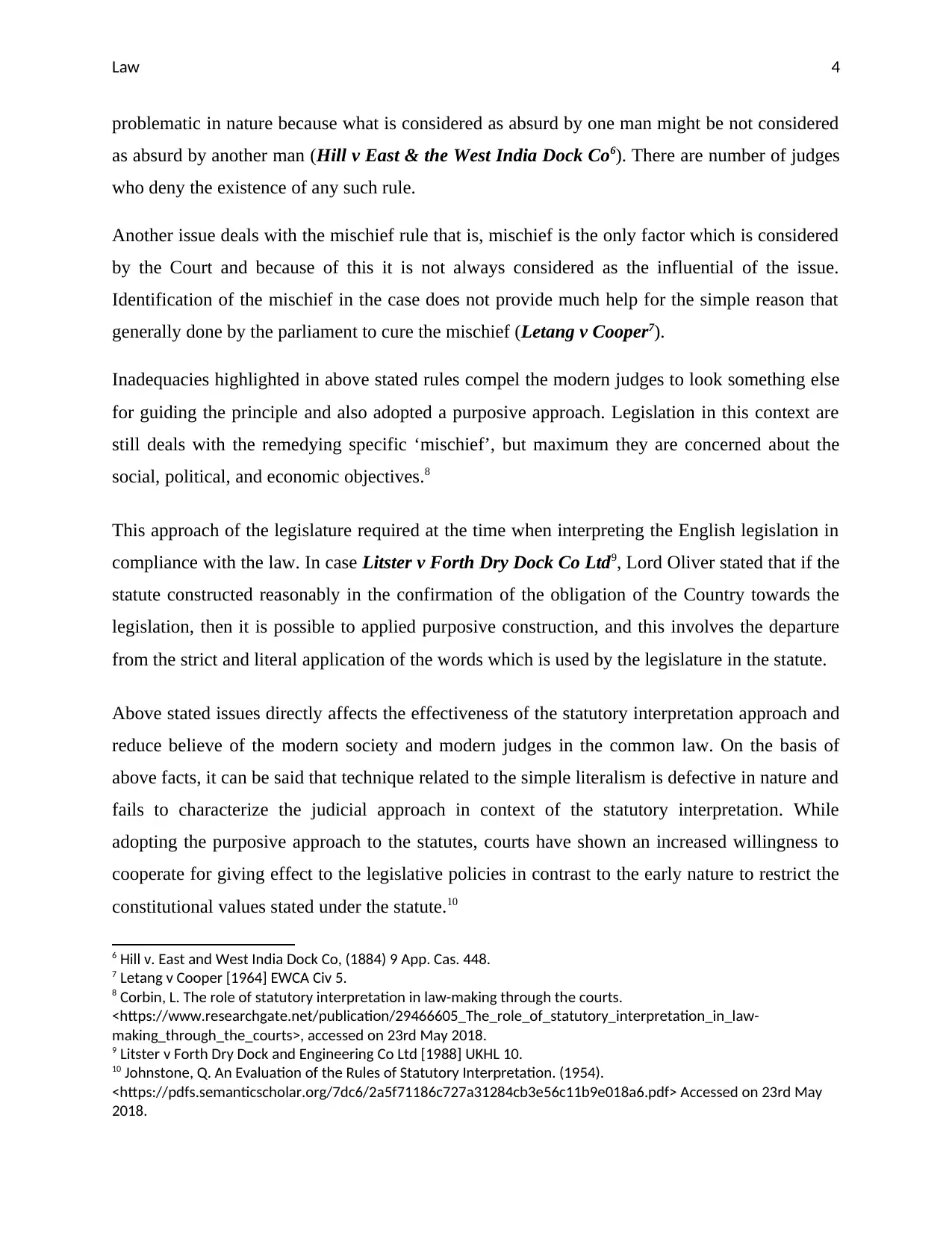
Law 4
problematic in nature because what is considered as absurd by one man might be not considered
as absurd by another man (Hill v East & the West India Dock Co6). There are number of judges
who deny the existence of any such rule.
Another issue deals with the mischief rule that is, mischief is the only factor which is considered
by the Court and because of this it is not always considered as the influential of the issue.
Identification of the mischief in the case does not provide much help for the simple reason that
generally done by the parliament to cure the mischief (Letang v Cooper7).
Inadequacies highlighted in above stated rules compel the modern judges to look something else
for guiding the principle and also adopted a purposive approach. Legislation in this context are
still deals with the remedying specific ‘mischief’, but maximum they are concerned about the
social, political, and economic objectives.8
This approach of the legislature required at the time when interpreting the English legislation in
compliance with the law. In case Litster v Forth Dry Dock Co Ltd9, Lord Oliver stated that if the
statute constructed reasonably in the confirmation of the obligation of the Country towards the
legislation, then it is possible to applied purposive construction, and this involves the departure
from the strict and literal application of the words which is used by the legislature in the statute.
Above stated issues directly affects the effectiveness of the statutory interpretation approach and
reduce believe of the modern society and modern judges in the common law. On the basis of
above facts, it can be said that technique related to the simple literalism is defective in nature and
fails to characterize the judicial approach in context of the statutory interpretation. While
adopting the purposive approach to the statutes, courts have shown an increased willingness to
cooperate for giving effect to the legislative policies in contrast to the early nature to restrict the
constitutional values stated under the statute.10
6 Hill v. East and West India Dock Co, (1884) 9 App. Cas. 448.
7 Letang v Cooper [1964] EWCA Civ 5.
8 Corbin, L. The role of statutory interpretation in law-making through the courts.
<https://www.researchgate.net/publication/29466605_The_role_of_statutory_interpretation_in_law-
making_through_the_courts>, accessed on 23rd May 2018.
9 Litster v Forth Dry Dock and Engineering Co Ltd [1988] UKHL 10.
10 Johnstone, Q. An Evaluation of the Rules of Statutory Interpretation. (1954).
<https://pdfs.semanticscholar.org/7dc6/2a5f71186c727a31284cb3e56c11b9e018a6.pdf> Accessed on 23rd May
2018.
problematic in nature because what is considered as absurd by one man might be not considered
as absurd by another man (Hill v East & the West India Dock Co6). There are number of judges
who deny the existence of any such rule.
Another issue deals with the mischief rule that is, mischief is the only factor which is considered
by the Court and because of this it is not always considered as the influential of the issue.
Identification of the mischief in the case does not provide much help for the simple reason that
generally done by the parliament to cure the mischief (Letang v Cooper7).
Inadequacies highlighted in above stated rules compel the modern judges to look something else
for guiding the principle and also adopted a purposive approach. Legislation in this context are
still deals with the remedying specific ‘mischief’, but maximum they are concerned about the
social, political, and economic objectives.8
This approach of the legislature required at the time when interpreting the English legislation in
compliance with the law. In case Litster v Forth Dry Dock Co Ltd9, Lord Oliver stated that if the
statute constructed reasonably in the confirmation of the obligation of the Country towards the
legislation, then it is possible to applied purposive construction, and this involves the departure
from the strict and literal application of the words which is used by the legislature in the statute.
Above stated issues directly affects the effectiveness of the statutory interpretation approach and
reduce believe of the modern society and modern judges in the common law. On the basis of
above facts, it can be said that technique related to the simple literalism is defective in nature and
fails to characterize the judicial approach in context of the statutory interpretation. While
adopting the purposive approach to the statutes, courts have shown an increased willingness to
cooperate for giving effect to the legislative policies in contrast to the early nature to restrict the
constitutional values stated under the statute.10
6 Hill v. East and West India Dock Co, (1884) 9 App. Cas. 448.
7 Letang v Cooper [1964] EWCA Civ 5.
8 Corbin, L. The role of statutory interpretation in law-making through the courts.
<https://www.researchgate.net/publication/29466605_The_role_of_statutory_interpretation_in_law-
making_through_the_courts>, accessed on 23rd May 2018.
9 Litster v Forth Dry Dock and Engineering Co Ltd [1988] UKHL 10.
10 Johnstone, Q. An Evaluation of the Rules of Statutory Interpretation. (1954).
<https://pdfs.semanticscholar.org/7dc6/2a5f71186c727a31284cb3e56c11b9e018a6.pdf> Accessed on 23rd May
2018.
Paraphrase This Document
Need a fresh take? Get an instant paraphrase of this document with our AI Paraphraser
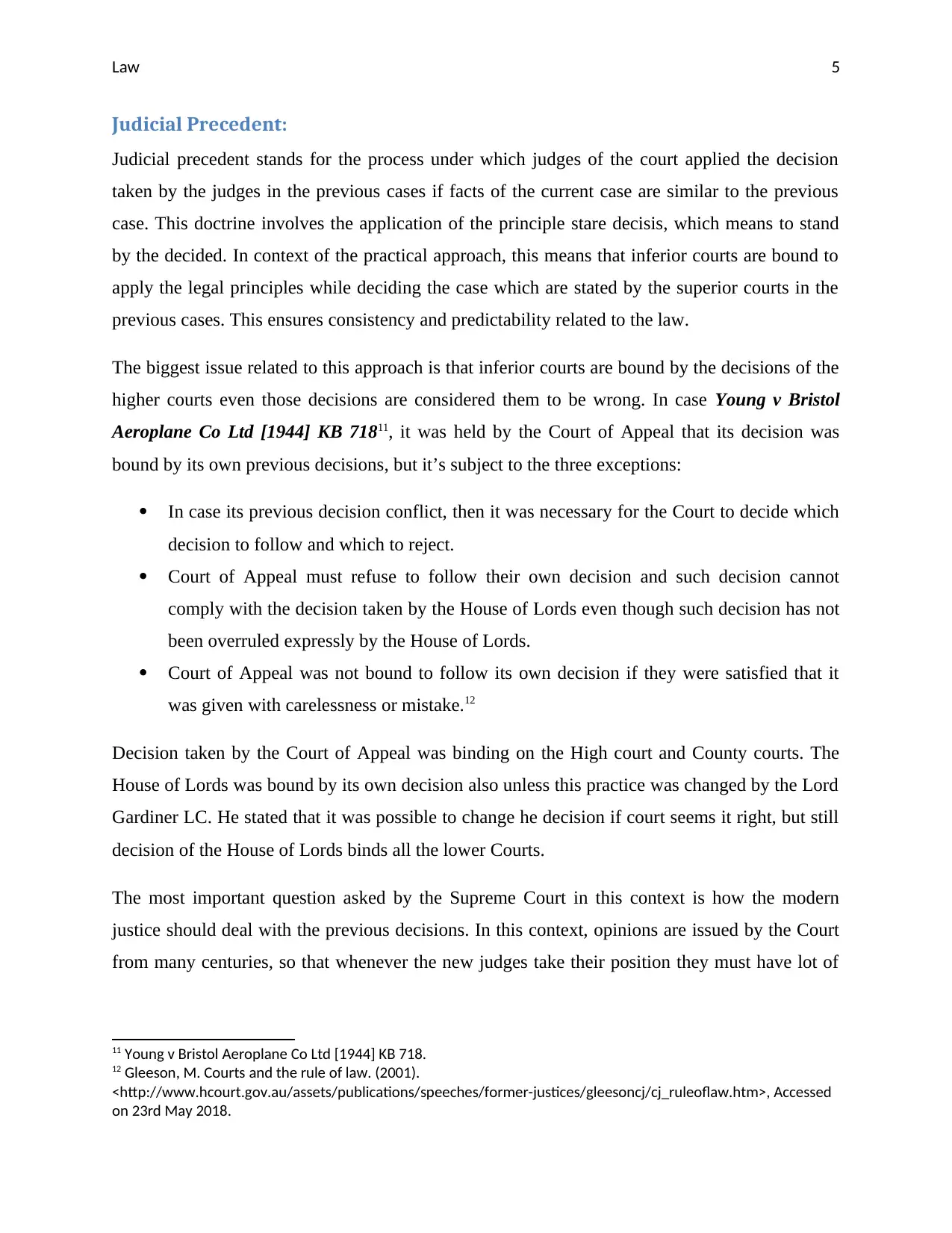
Law 5
Judicial Precedent:
Judicial precedent stands for the process under which judges of the court applied the decision
taken by the judges in the previous cases if facts of the current case are similar to the previous
case. This doctrine involves the application of the principle stare decisis, which means to stand
by the decided. In context of the practical approach, this means that inferior courts are bound to
apply the legal principles while deciding the case which are stated by the superior courts in the
previous cases. This ensures consistency and predictability related to the law.
The biggest issue related to this approach is that inferior courts are bound by the decisions of the
higher courts even those decisions are considered them to be wrong. In case Young v Bristol
Aeroplane Co Ltd [1944] KB 71811, it was held by the Court of Appeal that its decision was
bound by its own previous decisions, but it’s subject to the three exceptions:
In case its previous decision conflict, then it was necessary for the Court to decide which
decision to follow and which to reject.
Court of Appeal must refuse to follow their own decision and such decision cannot
comply with the decision taken by the House of Lords even though such decision has not
been overruled expressly by the House of Lords.
Court of Appeal was not bound to follow its own decision if they were satisfied that it
was given with carelessness or mistake.12
Decision taken by the Court of Appeal was binding on the High court and County courts. The
House of Lords was bound by its own decision also unless this practice was changed by the Lord
Gardiner LC. He stated that it was possible to change he decision if court seems it right, but still
decision of the House of Lords binds all the lower Courts.
The most important question asked by the Supreme Court in this context is how the modern
justice should deal with the previous decisions. In this context, opinions are issued by the Court
from many centuries, so that whenever the new judges take their position they must have lot of
11 Young v Bristol Aeroplane Co Ltd [1944] KB 718.
12 Gleeson, M. Courts and the rule of law. (2001).
<http://www.hcourt.gov.au/assets/publications/speeches/former-justices/gleesoncj/cj_ruleoflaw.htm>, Accessed
on 23rd May 2018.
Judicial Precedent:
Judicial precedent stands for the process under which judges of the court applied the decision
taken by the judges in the previous cases if facts of the current case are similar to the previous
case. This doctrine involves the application of the principle stare decisis, which means to stand
by the decided. In context of the practical approach, this means that inferior courts are bound to
apply the legal principles while deciding the case which are stated by the superior courts in the
previous cases. This ensures consistency and predictability related to the law.
The biggest issue related to this approach is that inferior courts are bound by the decisions of the
higher courts even those decisions are considered them to be wrong. In case Young v Bristol
Aeroplane Co Ltd [1944] KB 71811, it was held by the Court of Appeal that its decision was
bound by its own previous decisions, but it’s subject to the three exceptions:
In case its previous decision conflict, then it was necessary for the Court to decide which
decision to follow and which to reject.
Court of Appeal must refuse to follow their own decision and such decision cannot
comply with the decision taken by the House of Lords even though such decision has not
been overruled expressly by the House of Lords.
Court of Appeal was not bound to follow its own decision if they were satisfied that it
was given with carelessness or mistake.12
Decision taken by the Court of Appeal was binding on the High court and County courts. The
House of Lords was bound by its own decision also unless this practice was changed by the Lord
Gardiner LC. He stated that it was possible to change he decision if court seems it right, but still
decision of the House of Lords binds all the lower Courts.
The most important question asked by the Supreme Court in this context is how the modern
justice should deal with the previous decisions. In this context, opinions are issued by the Court
from many centuries, so that whenever the new judges take their position they must have lot of
11 Young v Bristol Aeroplane Co Ltd [1944] KB 718.
12 Gleeson, M. Courts and the rule of law. (2001).
<http://www.hcourt.gov.au/assets/publications/speeches/former-justices/gleesoncj/cj_ruleoflaw.htm>, Accessed
on 23rd May 2018.
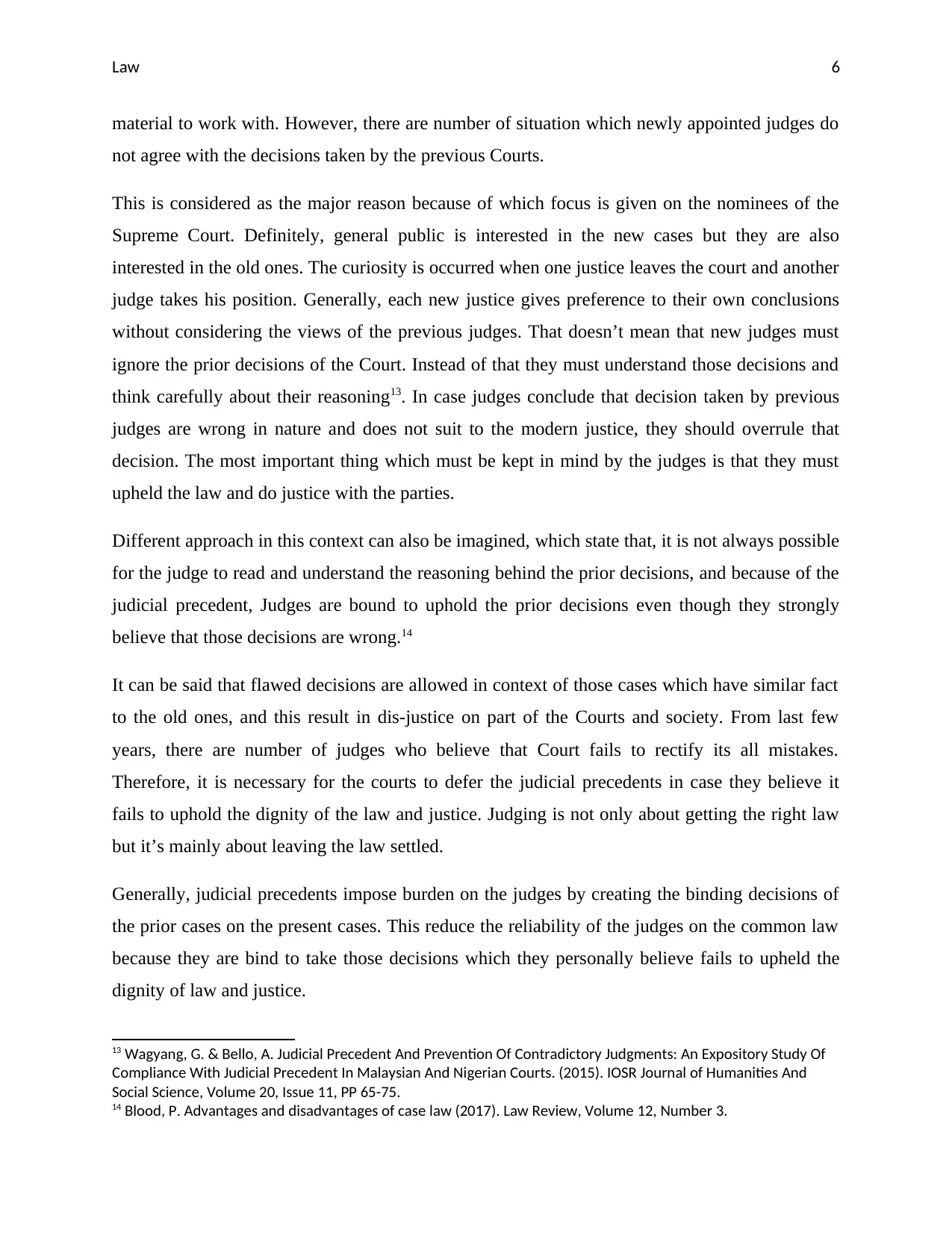
Law 6
material to work with. However, there are number of situation which newly appointed judges do
not agree with the decisions taken by the previous Courts.
This is considered as the major reason because of which focus is given on the nominees of the
Supreme Court. Definitely, general public is interested in the new cases but they are also
interested in the old ones. The curiosity is occurred when one justice leaves the court and another
judge takes his position. Generally, each new justice gives preference to their own conclusions
without considering the views of the previous judges. That doesn’t mean that new judges must
ignore the prior decisions of the Court. Instead of that they must understand those decisions and
think carefully about their reasoning13. In case judges conclude that decision taken by previous
judges are wrong in nature and does not suit to the modern justice, they should overrule that
decision. The most important thing which must be kept in mind by the judges is that they must
upheld the law and do justice with the parties.
Different approach in this context can also be imagined, which state that, it is not always possible
for the judge to read and understand the reasoning behind the prior decisions, and because of the
judicial precedent, Judges are bound to uphold the prior decisions even though they strongly
believe that those decisions are wrong.14
It can be said that flawed decisions are allowed in context of those cases which have similar fact
to the old ones, and this result in dis-justice on part of the Courts and society. From last few
years, there are number of judges who believe that Court fails to rectify its all mistakes.
Therefore, it is necessary for the courts to defer the judicial precedents in case they believe it
fails to uphold the dignity of the law and justice. Judging is not only about getting the right law
but it’s mainly about leaving the law settled.
Generally, judicial precedents impose burden on the judges by creating the binding decisions of
the prior cases on the present cases. This reduce the reliability of the judges on the common law
because they are bind to take those decisions which they personally believe fails to upheld the
dignity of law and justice.
13 Wagyang, G. & Bello, A. Judicial Precedent And Prevention Of Contradictory Judgments: An Expository Study Of
Compliance With Judicial Precedent In Malaysian And Nigerian Courts. (2015). IOSR Journal of Humanities And
Social Science, Volume 20, Issue 11, PP 65-75.
14 Blood, P. Advantages and disadvantages of case law (2017). Law Review, Volume 12, Number 3.
material to work with. However, there are number of situation which newly appointed judges do
not agree with the decisions taken by the previous Courts.
This is considered as the major reason because of which focus is given on the nominees of the
Supreme Court. Definitely, general public is interested in the new cases but they are also
interested in the old ones. The curiosity is occurred when one justice leaves the court and another
judge takes his position. Generally, each new justice gives preference to their own conclusions
without considering the views of the previous judges. That doesn’t mean that new judges must
ignore the prior decisions of the Court. Instead of that they must understand those decisions and
think carefully about their reasoning13. In case judges conclude that decision taken by previous
judges are wrong in nature and does not suit to the modern justice, they should overrule that
decision. The most important thing which must be kept in mind by the judges is that they must
upheld the law and do justice with the parties.
Different approach in this context can also be imagined, which state that, it is not always possible
for the judge to read and understand the reasoning behind the prior decisions, and because of the
judicial precedent, Judges are bound to uphold the prior decisions even though they strongly
believe that those decisions are wrong.14
It can be said that flawed decisions are allowed in context of those cases which have similar fact
to the old ones, and this result in dis-justice on part of the Courts and society. From last few
years, there are number of judges who believe that Court fails to rectify its all mistakes.
Therefore, it is necessary for the courts to defer the judicial precedents in case they believe it
fails to uphold the dignity of the law and justice. Judging is not only about getting the right law
but it’s mainly about leaving the law settled.
Generally, judicial precedents impose burden on the judges by creating the binding decisions of
the prior cases on the present cases. This reduce the reliability of the judges on the common law
because they are bind to take those decisions which they personally believe fails to upheld the
dignity of law and justice.
13 Wagyang, G. & Bello, A. Judicial Precedent And Prevention Of Contradictory Judgments: An Expository Study Of
Compliance With Judicial Precedent In Malaysian And Nigerian Courts. (2015). IOSR Journal of Humanities And
Social Science, Volume 20, Issue 11, PP 65-75.
14 Blood, P. Advantages and disadvantages of case law (2017). Law Review, Volume 12, Number 3.
⊘ This is a preview!⊘
Do you want full access?
Subscribe today to unlock all pages.

Trusted by 1+ million students worldwide
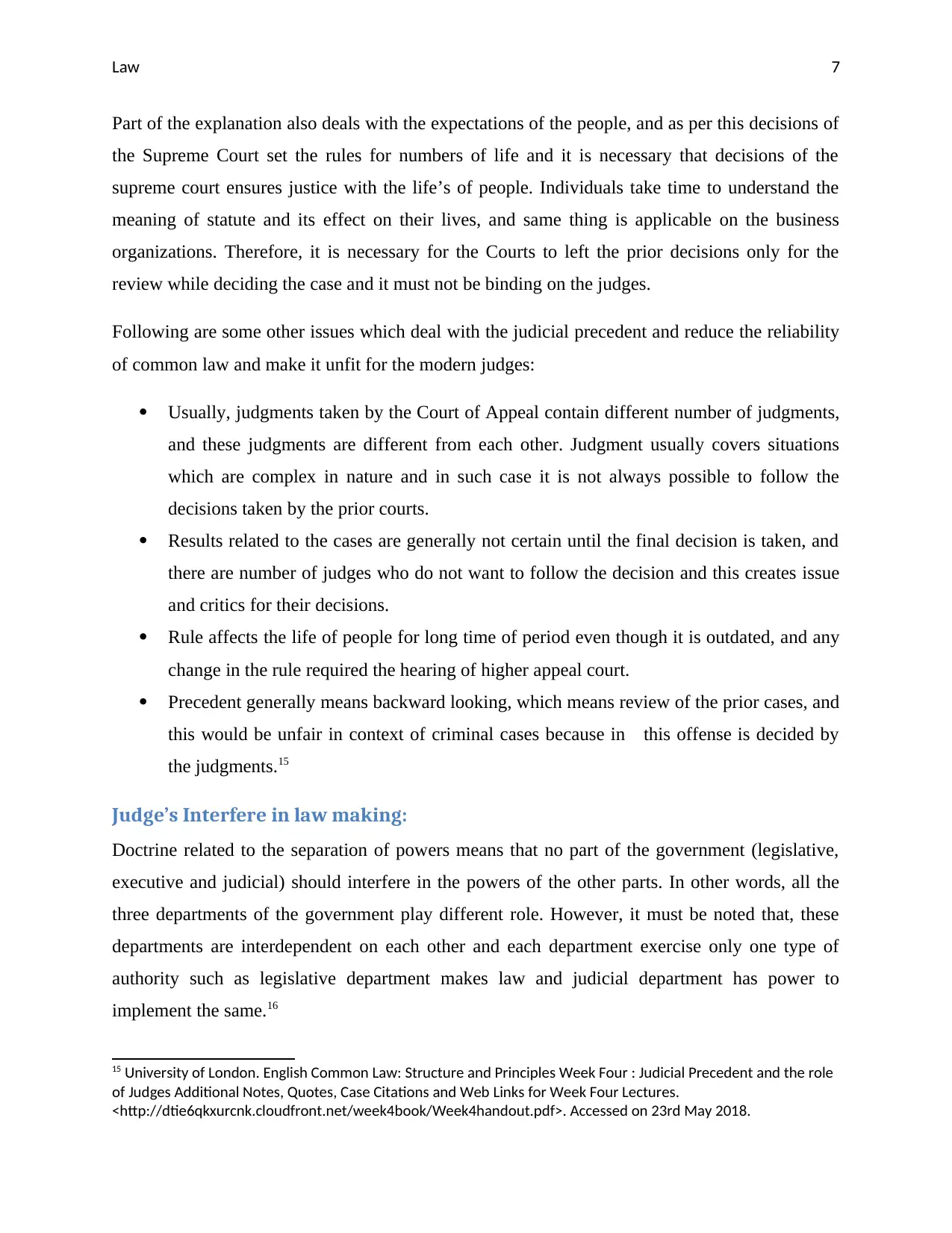
Law 7
Part of the explanation also deals with the expectations of the people, and as per this decisions of
the Supreme Court set the rules for numbers of life and it is necessary that decisions of the
supreme court ensures justice with the life’s of people. Individuals take time to understand the
meaning of statute and its effect on their lives, and same thing is applicable on the business
organizations. Therefore, it is necessary for the Courts to left the prior decisions only for the
review while deciding the case and it must not be binding on the judges.
Following are some other issues which deal with the judicial precedent and reduce the reliability
of common law and make it unfit for the modern judges:
Usually, judgments taken by the Court of Appeal contain different number of judgments,
and these judgments are different from each other. Judgment usually covers situations
which are complex in nature and in such case it is not always possible to follow the
decisions taken by the prior courts.
Results related to the cases are generally not certain until the final decision is taken, and
there are number of judges who do not want to follow the decision and this creates issue
and critics for their decisions.
Rule affects the life of people for long time of period even though it is outdated, and any
change in the rule required the hearing of higher appeal court.
Precedent generally means backward looking, which means review of the prior cases, and
this would be unfair in context of criminal cases because in this offense is decided by
the judgments.15
Judge’s Interfere in law making:
Doctrine related to the separation of powers means that no part of the government (legislative,
executive and judicial) should interfere in the powers of the other parts. In other words, all the
three departments of the government play different role. However, it must be noted that, these
departments are interdependent on each other and each department exercise only one type of
authority such as legislative department makes law and judicial department has power to
implement the same.16
15 University of London. English Common Law: Structure and Principles Week Four : Judicial Precedent and the role
of Judges Additional Notes, Quotes, Case Citations and Web Links for Week Four Lectures.
<http://dtie6qkxurcnk.cloudfront.net/week4book/Week4handout.pdf>. Accessed on 23rd May 2018.
Part of the explanation also deals with the expectations of the people, and as per this decisions of
the Supreme Court set the rules for numbers of life and it is necessary that decisions of the
supreme court ensures justice with the life’s of people. Individuals take time to understand the
meaning of statute and its effect on their lives, and same thing is applicable on the business
organizations. Therefore, it is necessary for the Courts to left the prior decisions only for the
review while deciding the case and it must not be binding on the judges.
Following are some other issues which deal with the judicial precedent and reduce the reliability
of common law and make it unfit for the modern judges:
Usually, judgments taken by the Court of Appeal contain different number of judgments,
and these judgments are different from each other. Judgment usually covers situations
which are complex in nature and in such case it is not always possible to follow the
decisions taken by the prior courts.
Results related to the cases are generally not certain until the final decision is taken, and
there are number of judges who do not want to follow the decision and this creates issue
and critics for their decisions.
Rule affects the life of people for long time of period even though it is outdated, and any
change in the rule required the hearing of higher appeal court.
Precedent generally means backward looking, which means review of the prior cases, and
this would be unfair in context of criminal cases because in this offense is decided by
the judgments.15
Judge’s Interfere in law making:
Doctrine related to the separation of powers means that no part of the government (legislative,
executive and judicial) should interfere in the powers of the other parts. In other words, all the
three departments of the government play different role. However, it must be noted that, these
departments are interdependent on each other and each department exercise only one type of
authority such as legislative department makes law and judicial department has power to
implement the same.16
15 University of London. English Common Law: Structure and Principles Week Four : Judicial Precedent and the role
of Judges Additional Notes, Quotes, Case Citations and Web Links for Week Four Lectures.
<http://dtie6qkxurcnk.cloudfront.net/week4book/Week4handout.pdf>. Accessed on 23rd May 2018.
Paraphrase This Document
Need a fresh take? Get an instant paraphrase of this document with our AI Paraphraser
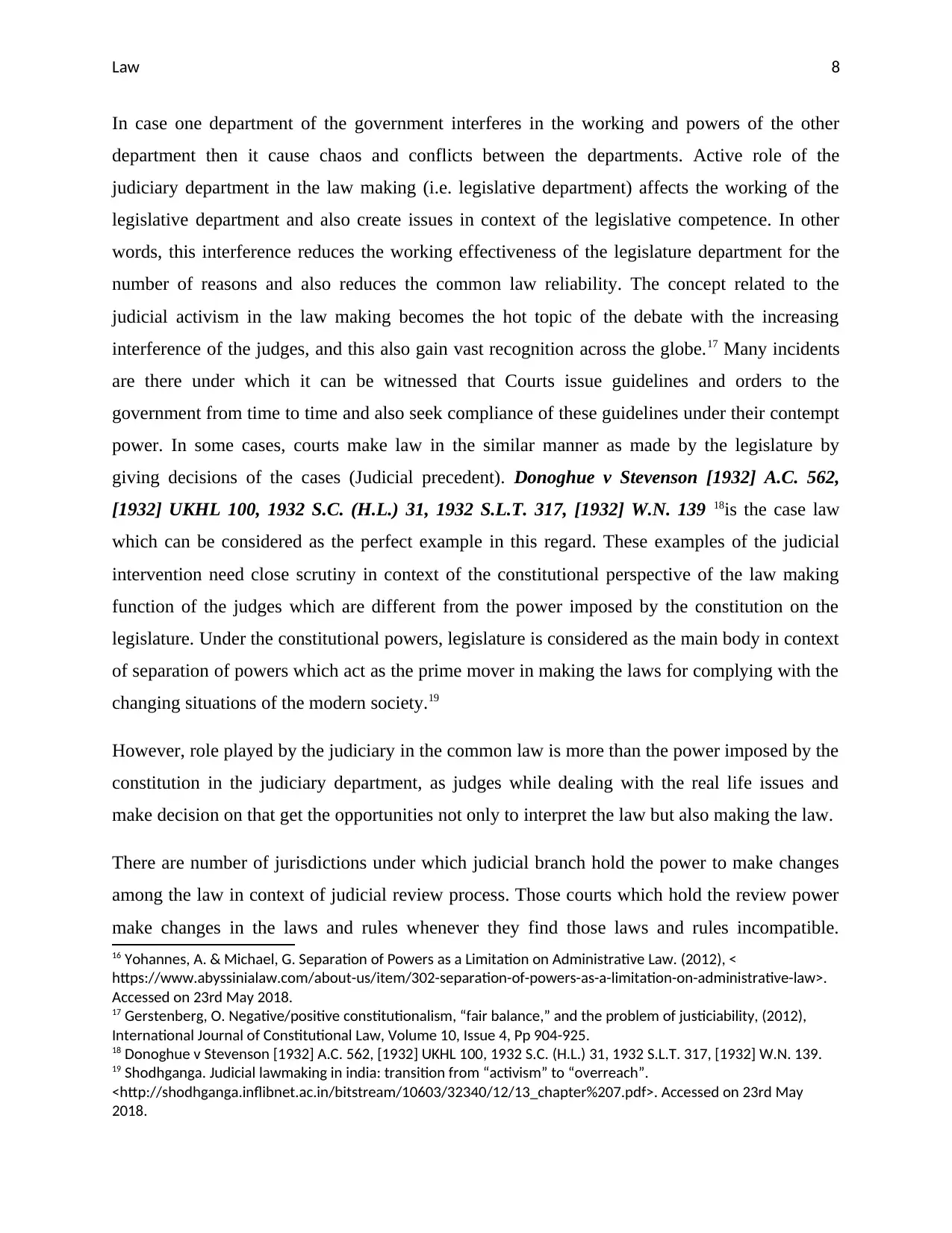
Law 8
In case one department of the government interferes in the working and powers of the other
department then it cause chaos and conflicts between the departments. Active role of the
judiciary department in the law making (i.e. legislative department) affects the working of the
legislative department and also create issues in context of the legislative competence. In other
words, this interference reduces the working effectiveness of the legislature department for the
number of reasons and also reduces the common law reliability. The concept related to the
judicial activism in the law making becomes the hot topic of the debate with the increasing
interference of the judges, and this also gain vast recognition across the globe.17 Many incidents
are there under which it can be witnessed that Courts issue guidelines and orders to the
government from time to time and also seek compliance of these guidelines under their contempt
power. In some cases, courts make law in the similar manner as made by the legislature by
giving decisions of the cases (Judicial precedent). Donoghue v Stevenson [1932] A.C. 562,
[1932] UKHL 100, 1932 S.C. (H.L.) 31, 1932 S.L.T. 317, [1932] W.N. 139 18is the case law
which can be considered as the perfect example in this regard. These examples of the judicial
intervention need close scrutiny in context of the constitutional perspective of the law making
function of the judges which are different from the power imposed by the constitution on the
legislature. Under the constitutional powers, legislature is considered as the main body in context
of separation of powers which act as the prime mover in making the laws for complying with the
changing situations of the modern society.19
However, role played by the judiciary in the common law is more than the power imposed by the
constitution in the judiciary department, as judges while dealing with the real life issues and
make decision on that get the opportunities not only to interpret the law but also making the law.
There are number of jurisdictions under which judicial branch hold the power to make changes
among the law in context of judicial review process. Those courts which hold the review power
make changes in the laws and rules whenever they find those laws and rules incompatible.
16 Yohannes, A. & Michael, G. Separation of Powers as a Limitation on Administrative Law. (2012), <
https://www.abyssinialaw.com/about-us/item/302-separation-of-powers-as-a-limitation-on-administrative-law>.
Accessed on 23rd May 2018.
17 Gerstenberg, O. Negative/positive constitutionalism, “fair balance,” and the problem of justiciability, (2012),
International Journal of Constitutional Law, Volume 10, Issue 4, Pp 904-925.
18 Donoghue v Stevenson [1932] A.C. 562, [1932] UKHL 100, 1932 S.C. (H.L.) 31, 1932 S.L.T. 317, [1932] W.N. 139.
19 Shodhganga. Judicial lawmaking in india: transition from “activism” to “overreach”.
<http://shodhganga.inflibnet.ac.in/bitstream/10603/32340/12/13_chapter%207.pdf>. Accessed on 23rd May
2018.
In case one department of the government interferes in the working and powers of the other
department then it cause chaos and conflicts between the departments. Active role of the
judiciary department in the law making (i.e. legislative department) affects the working of the
legislative department and also create issues in context of the legislative competence. In other
words, this interference reduces the working effectiveness of the legislature department for the
number of reasons and also reduces the common law reliability. The concept related to the
judicial activism in the law making becomes the hot topic of the debate with the increasing
interference of the judges, and this also gain vast recognition across the globe.17 Many incidents
are there under which it can be witnessed that Courts issue guidelines and orders to the
government from time to time and also seek compliance of these guidelines under their contempt
power. In some cases, courts make law in the similar manner as made by the legislature by
giving decisions of the cases (Judicial precedent). Donoghue v Stevenson [1932] A.C. 562,
[1932] UKHL 100, 1932 S.C. (H.L.) 31, 1932 S.L.T. 317, [1932] W.N. 139 18is the case law
which can be considered as the perfect example in this regard. These examples of the judicial
intervention need close scrutiny in context of the constitutional perspective of the law making
function of the judges which are different from the power imposed by the constitution on the
legislature. Under the constitutional powers, legislature is considered as the main body in context
of separation of powers which act as the prime mover in making the laws for complying with the
changing situations of the modern society.19
However, role played by the judiciary in the common law is more than the power imposed by the
constitution in the judiciary department, as judges while dealing with the real life issues and
make decision on that get the opportunities not only to interpret the law but also making the law.
There are number of jurisdictions under which judicial branch hold the power to make changes
among the law in context of judicial review process. Those courts which hold the review power
make changes in the laws and rules whenever they find those laws and rules incompatible.
16 Yohannes, A. & Michael, G. Separation of Powers as a Limitation on Administrative Law. (2012), <
https://www.abyssinialaw.com/about-us/item/302-separation-of-powers-as-a-limitation-on-administrative-law>.
Accessed on 23rd May 2018.
17 Gerstenberg, O. Negative/positive constitutionalism, “fair balance,” and the problem of justiciability, (2012),
International Journal of Constitutional Law, Volume 10, Issue 4, Pp 904-925.
18 Donoghue v Stevenson [1932] A.C. 562, [1932] UKHL 100, 1932 S.C. (H.L.) 31, 1932 S.L.T. 317, [1932] W.N. 139.
19 Shodhganga. Judicial lawmaking in india: transition from “activism” to “overreach”.
<http://shodhganga.inflibnet.ac.in/bitstream/10603/32340/12/13_chapter%207.pdf>. Accessed on 23rd May
2018.
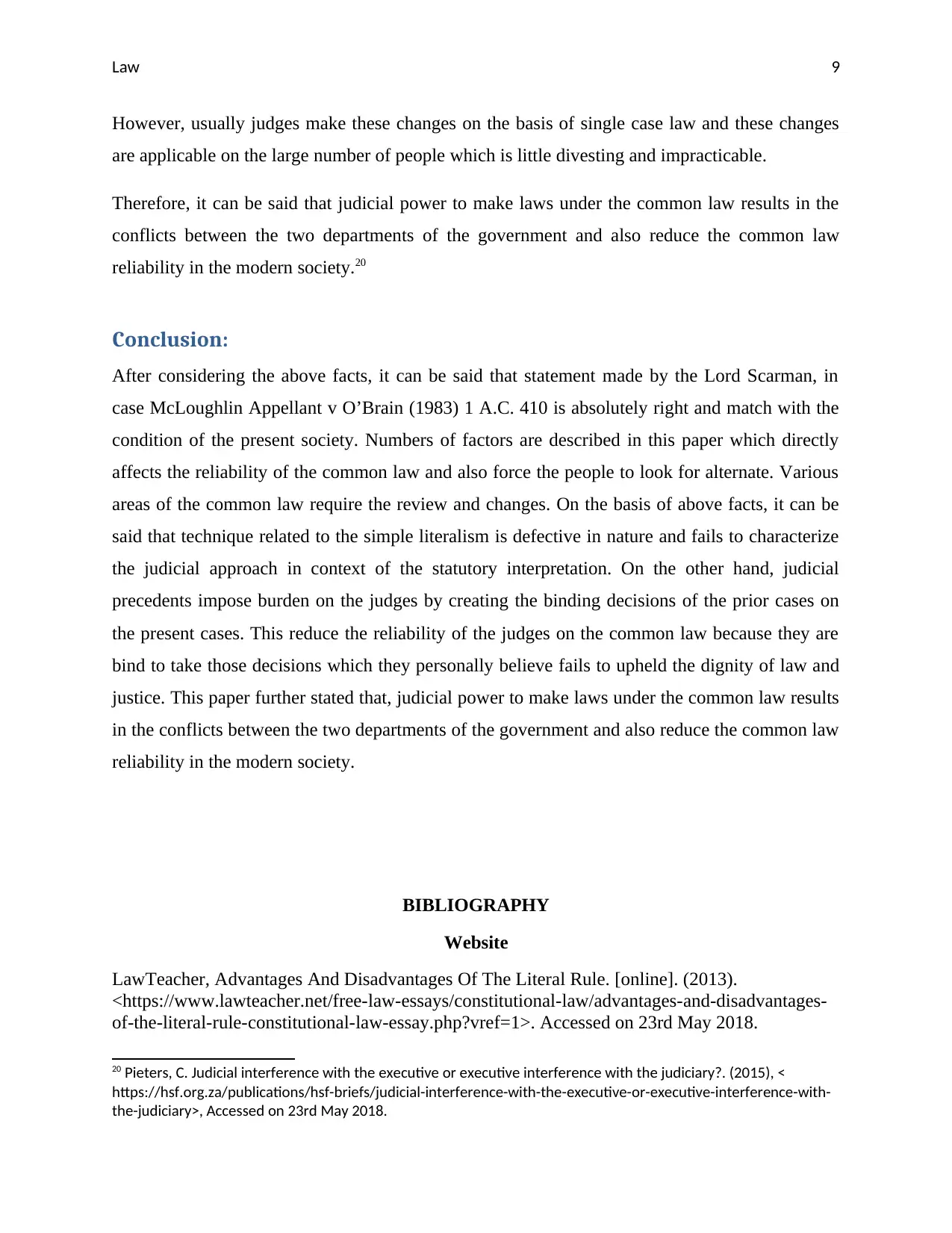
Law 9
However, usually judges make these changes on the basis of single case law and these changes
are applicable on the large number of people which is little divesting and impracticable.
Therefore, it can be said that judicial power to make laws under the common law results in the
conflicts between the two departments of the government and also reduce the common law
reliability in the modern society.20
Conclusion:
After considering the above facts, it can be said that statement made by the Lord Scarman, in
case McLoughlin Appellant v O’Brain (1983) 1 A.C. 410 is absolutely right and match with the
condition of the present society. Numbers of factors are described in this paper which directly
affects the reliability of the common law and also force the people to look for alternate. Various
areas of the common law require the review and changes. On the basis of above facts, it can be
said that technique related to the simple literalism is defective in nature and fails to characterize
the judicial approach in context of the statutory interpretation. On the other hand, judicial
precedents impose burden on the judges by creating the binding decisions of the prior cases on
the present cases. This reduce the reliability of the judges on the common law because they are
bind to take those decisions which they personally believe fails to upheld the dignity of law and
justice. This paper further stated that, judicial power to make laws under the common law results
in the conflicts between the two departments of the government and also reduce the common law
reliability in the modern society.
BIBLIOGRAPHY
Website
LawTeacher, Advantages And Disadvantages Of The Literal Rule. [online]. (2013).
<https://www.lawteacher.net/free-law-essays/constitutional-law/advantages-and-disadvantages-
of-the-literal-rule-constitutional-law-essay.php?vref=1>. Accessed on 23rd May 2018.
20 Pieters, C. Judicial interference with the executive or executive interference with the judiciary?. (2015), <
https://hsf.org.za/publications/hsf-briefs/judicial-interference-with-the-executive-or-executive-interference-with-
the-judiciary>, Accessed on 23rd May 2018.
However, usually judges make these changes on the basis of single case law and these changes
are applicable on the large number of people which is little divesting and impracticable.
Therefore, it can be said that judicial power to make laws under the common law results in the
conflicts between the two departments of the government and also reduce the common law
reliability in the modern society.20
Conclusion:
After considering the above facts, it can be said that statement made by the Lord Scarman, in
case McLoughlin Appellant v O’Brain (1983) 1 A.C. 410 is absolutely right and match with the
condition of the present society. Numbers of factors are described in this paper which directly
affects the reliability of the common law and also force the people to look for alternate. Various
areas of the common law require the review and changes. On the basis of above facts, it can be
said that technique related to the simple literalism is defective in nature and fails to characterize
the judicial approach in context of the statutory interpretation. On the other hand, judicial
precedents impose burden on the judges by creating the binding decisions of the prior cases on
the present cases. This reduce the reliability of the judges on the common law because they are
bind to take those decisions which they personally believe fails to upheld the dignity of law and
justice. This paper further stated that, judicial power to make laws under the common law results
in the conflicts between the two departments of the government and also reduce the common law
reliability in the modern society.
BIBLIOGRAPHY
Website
LawTeacher, Advantages And Disadvantages Of The Literal Rule. [online]. (2013).
<https://www.lawteacher.net/free-law-essays/constitutional-law/advantages-and-disadvantages-
of-the-literal-rule-constitutional-law-essay.php?vref=1>. Accessed on 23rd May 2018.
20 Pieters, C. Judicial interference with the executive or executive interference with the judiciary?. (2015), <
https://hsf.org.za/publications/hsf-briefs/judicial-interference-with-the-executive-or-executive-interference-with-
the-judiciary>, Accessed on 23rd May 2018.
⊘ This is a preview!⊘
Do you want full access?
Subscribe today to unlock all pages.

Trusted by 1+ million students worldwide
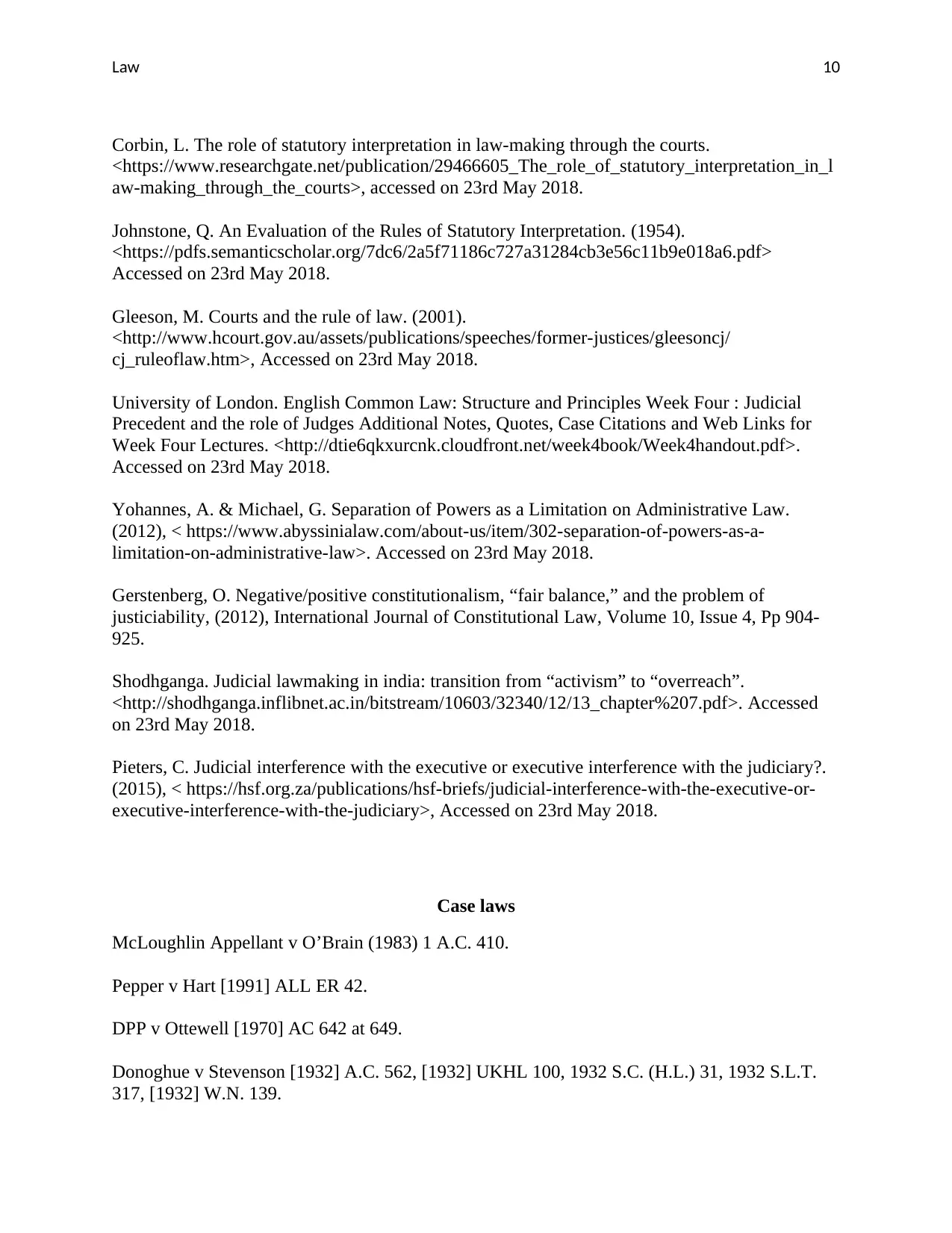
Law 10
Corbin, L. The role of statutory interpretation in law-making through the courts.
<https://www.researchgate.net/publication/29466605_The_role_of_statutory_interpretation_in_l
aw-making_through_the_courts>, accessed on 23rd May 2018.
Johnstone, Q. An Evaluation of the Rules of Statutory Interpretation. (1954).
<https://pdfs.semanticscholar.org/7dc6/2a5f71186c727a31284cb3e56c11b9e018a6.pdf>
Accessed on 23rd May 2018.
Gleeson, M. Courts and the rule of law. (2001).
<http://www.hcourt.gov.au/assets/publications/speeches/former-justices/gleesoncj/
cj_ruleoflaw.htm>, Accessed on 23rd May 2018.
University of London. English Common Law: Structure and Principles Week Four : Judicial
Precedent and the role of Judges Additional Notes, Quotes, Case Citations and Web Links for
Week Four Lectures. <http://dtie6qkxurcnk.cloudfront.net/week4book/Week4handout.pdf>.
Accessed on 23rd May 2018.
Yohannes, A. & Michael, G. Separation of Powers as a Limitation on Administrative Law.
(2012), < https://www.abyssinialaw.com/about-us/item/302-separation-of-powers-as-a-
limitation-on-administrative-law>. Accessed on 23rd May 2018.
Gerstenberg, O. Negative/positive constitutionalism, “fair balance,” and the problem of
justiciability, (2012), International Journal of Constitutional Law, Volume 10, Issue 4, Pp 904-
925.
Shodhganga. Judicial lawmaking in india: transition from “activism” to “overreach”.
<http://shodhganga.inflibnet.ac.in/bitstream/10603/32340/12/13_chapter%207.pdf>. Accessed
on 23rd May 2018.
Pieters, C. Judicial interference with the executive or executive interference with the judiciary?.
(2015), < https://hsf.org.za/publications/hsf-briefs/judicial-interference-with-the-executive-or-
executive-interference-with-the-judiciary>, Accessed on 23rd May 2018.
Case laws
McLoughlin Appellant v O’Brain (1983) 1 A.C. 410.
Pepper v Hart [1991] ALL ER 42.
DPP v Ottewell [1970] AC 642 at 649.
Donoghue v Stevenson [1932] A.C. 562, [1932] UKHL 100, 1932 S.C. (H.L.) 31, 1932 S.L.T.
317, [1932] W.N. 139.
Corbin, L. The role of statutory interpretation in law-making through the courts.
<https://www.researchgate.net/publication/29466605_The_role_of_statutory_interpretation_in_l
aw-making_through_the_courts>, accessed on 23rd May 2018.
Johnstone, Q. An Evaluation of the Rules of Statutory Interpretation. (1954).
<https://pdfs.semanticscholar.org/7dc6/2a5f71186c727a31284cb3e56c11b9e018a6.pdf>
Accessed on 23rd May 2018.
Gleeson, M. Courts and the rule of law. (2001).
<http://www.hcourt.gov.au/assets/publications/speeches/former-justices/gleesoncj/
cj_ruleoflaw.htm>, Accessed on 23rd May 2018.
University of London. English Common Law: Structure and Principles Week Four : Judicial
Precedent and the role of Judges Additional Notes, Quotes, Case Citations and Web Links for
Week Four Lectures. <http://dtie6qkxurcnk.cloudfront.net/week4book/Week4handout.pdf>.
Accessed on 23rd May 2018.
Yohannes, A. & Michael, G. Separation of Powers as a Limitation on Administrative Law.
(2012), < https://www.abyssinialaw.com/about-us/item/302-separation-of-powers-as-a-
limitation-on-administrative-law>. Accessed on 23rd May 2018.
Gerstenberg, O. Negative/positive constitutionalism, “fair balance,” and the problem of
justiciability, (2012), International Journal of Constitutional Law, Volume 10, Issue 4, Pp 904-
925.
Shodhganga. Judicial lawmaking in india: transition from “activism” to “overreach”.
<http://shodhganga.inflibnet.ac.in/bitstream/10603/32340/12/13_chapter%207.pdf>. Accessed
on 23rd May 2018.
Pieters, C. Judicial interference with the executive or executive interference with the judiciary?.
(2015), < https://hsf.org.za/publications/hsf-briefs/judicial-interference-with-the-executive-or-
executive-interference-with-the-judiciary>, Accessed on 23rd May 2018.
Case laws
McLoughlin Appellant v O’Brain (1983) 1 A.C. 410.
Pepper v Hart [1991] ALL ER 42.
DPP v Ottewell [1970] AC 642 at 649.
Donoghue v Stevenson [1932] A.C. 562, [1932] UKHL 100, 1932 S.C. (H.L.) 31, 1932 S.L.T.
317, [1932] W.N. 139.
Paraphrase This Document
Need a fresh take? Get an instant paraphrase of this document with our AI Paraphraser
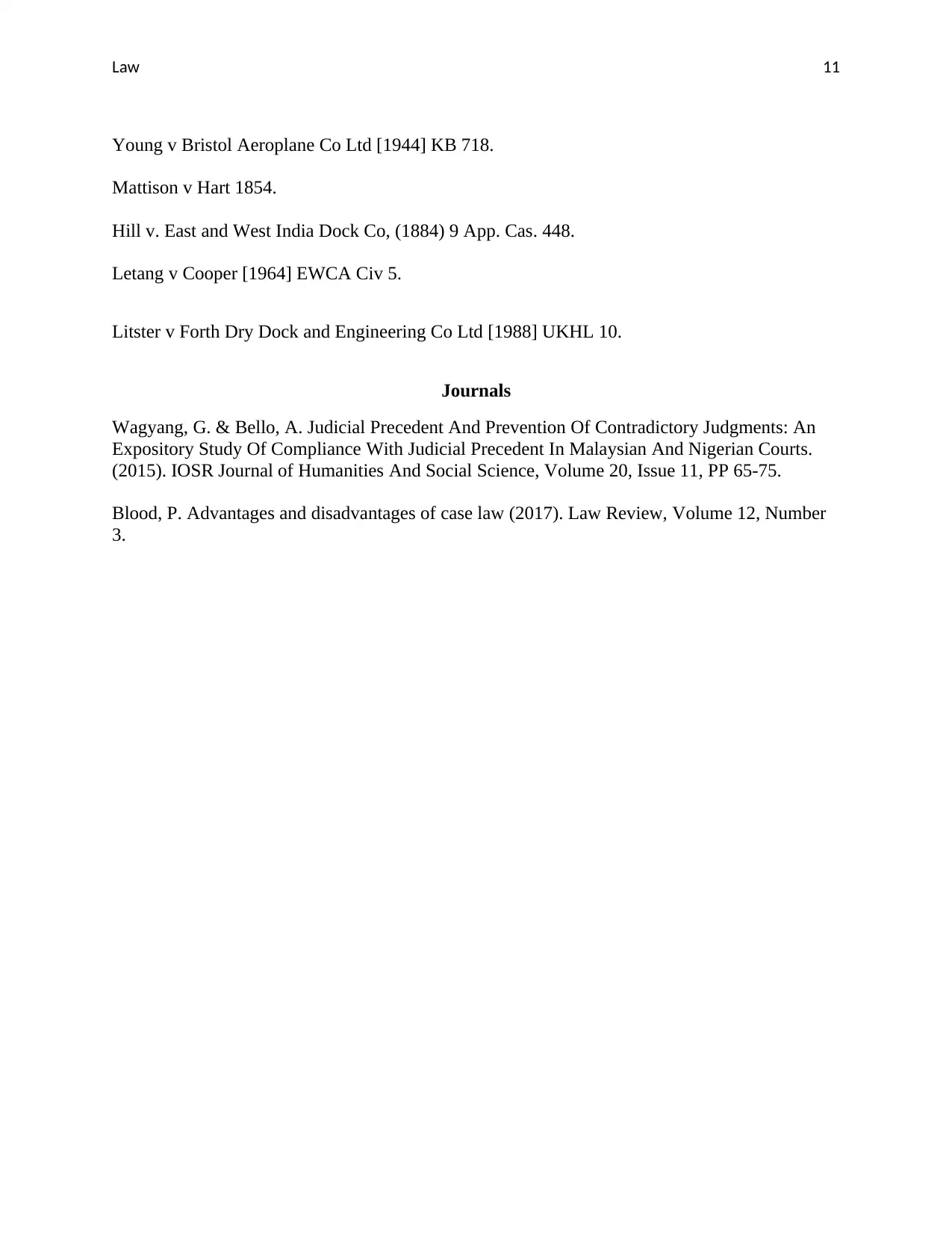
Law 11
Young v Bristol Aeroplane Co Ltd [1944] KB 718.
Mattison v Hart 1854.
Hill v. East and West India Dock Co, (1884) 9 App. Cas. 448.
Letang v Cooper [1964] EWCA Civ 5.
Litster v Forth Dry Dock and Engineering Co Ltd [1988] UKHL 10.
Journals
Wagyang, G. & Bello, A. Judicial Precedent And Prevention Of Contradictory Judgments: An
Expository Study Of Compliance With Judicial Precedent In Malaysian And Nigerian Courts.
(2015). IOSR Journal of Humanities And Social Science, Volume 20, Issue 11, PP 65-75.
Blood, P. Advantages and disadvantages of case law (2017). Law Review, Volume 12, Number
3.
Young v Bristol Aeroplane Co Ltd [1944] KB 718.
Mattison v Hart 1854.
Hill v. East and West India Dock Co, (1884) 9 App. Cas. 448.
Letang v Cooper [1964] EWCA Civ 5.
Litster v Forth Dry Dock and Engineering Co Ltd [1988] UKHL 10.
Journals
Wagyang, G. & Bello, A. Judicial Precedent And Prevention Of Contradictory Judgments: An
Expository Study Of Compliance With Judicial Precedent In Malaysian And Nigerian Courts.
(2015). IOSR Journal of Humanities And Social Science, Volume 20, Issue 11, PP 65-75.
Blood, P. Advantages and disadvantages of case law (2017). Law Review, Volume 12, Number
3.
1 out of 11
Related Documents
Your All-in-One AI-Powered Toolkit for Academic Success.
+13062052269
info@desklib.com
Available 24*7 on WhatsApp / Email
![[object Object]](/_next/static/media/star-bottom.7253800d.svg)
Unlock your academic potential
Copyright © 2020–2026 A2Z Services. All Rights Reserved. Developed and managed by ZUCOL.





